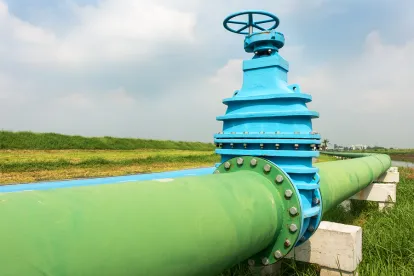Senate Committee approves bill to reauthorize pipeline safety programs and amend the Pipeline Safety Laws. DOT increases maximum civil penalties under the Pipeline Safety Act. Updated PHMSA Rulemakings Chart. PHMSA seeks comment on renewed information collection. Updates from Select States.
Senate Committee Approves Bill to Reauthorize Pipeline Safety Programs and Amend the Pipeline Safety Laws
On July 31, the Senate Commerce, Science and Transportation Committee approved by voice vote S.2299, the Pipes Act of 2019. The bill contains provisions addressing the evaluation and ranking of risks under distribution integrity management plans; the management of distribution system records and ensuring they are available to construction and engineering personnel; emergency response plans; management of change; review of construction plans by qualified personnel; and reducing the risk of line overpressurizations. S.2299 also would require that, when establishing a civil penalty, the Pipeline and Hazardous Materials Safety Administration (PHMSA) consider whether the operator self-disclosed and corrected an alleged violation before PHMSA discovered it.
Senator Tom Udall (D-NM) voted “no” on the bill because it does not contain language addressing the management of methane leaks. In addition, Senator Richard Blumenthal (D-CT) expressed concern that the Committee did not consider amendments on whistleblower protections. Both senators indicated their desire to address these amendments before the bill reaches the Senate floor later this fall.
DOT Increases Maximum Civil Penalties Under the Pipeline Safety Act.
On July 31, the Department of Transportation (DOT) issued a final rule increasing the civil penalties that PHMSA may assess for violations of the Pipeline Safety Act. Effective July 31, the maximum civil penalty for each pipeline safety violation increased from $213,268 to $218,647 per violation per day, and the maximum penalty for a related series of pipeline safety violations increased from $2,132,679 to $2,186,465. The maximum penalty for liquefied natural gas pipeline safety violations increased from $77,910 to $79,875. These increased penalties apply only to violations occurring after the rule’s July 31 effective date.
Updated PHMSA Rulemakings Chart. The chart below shows the status of PHMSA’s pending pipeline safety rulemakings as reflected in (1) DOT’s June Significant Rulemaking Report, (2) PHMSA’s status Chart of legislatively mandated actions, and (3) the Office of Management & Budget’s (OMB) Office of Information and Regulatory Affairs (OIRA) Spring 2019 Unified Agenda of Regulatory and Deregulatory Actions. The Unified Agenda appears in two principal parts, Current Agenda Agency Regulatory Entries for Active Actions and Current Long Term Actions.
Pending Final Rules
|
Proceeding |
DOT Estimated Publication |
OIRA Estimated Publication |
PHMSA’s Chart |
|
Emergency Order Procedures |
August 1, 2019 |
May 2019 |
July 26, 2019 |
|
Safety of Gas Transmission Pipelines, MAOP Reconfirmation, Expansion of Assessment Requirements and Other Related Amendments |
August 30, 2019 |
July 2019 |
August 30, 2019 |
|
Safety of Gas Transmission Pipelines, Repair Criteria, Integrity Management Improvements, Cathodic Protection, Management of Change, and Other Related Amendments |
December 20, 2019 |
December 2019 |
Not Listed |
|
Safety of Gas Gathering Pipelines |
June 26, 2020 |
December 2019 |
Not Listed |
|
Safety of Onshore Hazardous Liquid Pipelines |
June 28, 2019 |
December 2018 |
July 29, 2019 |
|
Underground Natural Gas Storage Facilities |
September 30, 2019 |
July 2019 |
October 22, 2019 |
Pending Notices of Proposed Rulemakings
|
Proceeding |
DOT Estimated Publication |
OIRA Estimated Publication |
PHMSA’s Chart |
|
Amendments to LNG Facilities |
September 2, 2019 |
October 2019 |
September 2, 2019 |
|
Class Location Requirements |
November 15, 2019 |
November 2019 |
Not Listed |
|
Gas Pipeline Regulatory Reform |
September 30, 2019 |
August 2019 |
Not Listed |
|
LNG by Rail |
July 29, 2019 |
Not Listed |
Not Listed |
|
Liquid Pipeline Regulatory Reform |
Not Listed |
June 2019 |
Not Listed |
|
Periodic Standards Update |
Not Listed |
April 2020 |
Not Listed |
|
Repair Criteria for Hazardous Liquid Pipelines |
June 26, 2020 |
Next Action Undetermined |
Not Listed |
|
Valve Installation and Minimum Rupture Detection Standards |
September 27, 2019 |
August 2019 |
September 27, 2019 |
Pending Advance Notices of Proposed Rulemakings
|
Proceeding |
DOT Estimated Publication |
OIRA Estimated Publication |
PHMSA’s Chart |
|
Coastal Ecological Unusually Sensitive Areas |
Not Listed |
April 2020 |
April 13, 2020 |
Other PHMSA Updates
PHMSA seeks comment on renewed information collection. On July 30, PHMSA issued a notice that it intends to submit a renewed information collection to OMB covering the reporting and recordkeeping requirements associated with the requirement that gas pipeline operators notify customers of their right to request the installation of excess flow valves. The existing information collection expires on March 31, 2020, and PHMSA intends to request renewal without change. Comments are due September 30.
Updates from Select States
Pennsylvania: Comments are due on August 28 regarding the Pennsylvania Public Utility Commission’s Advance Notice of Proposed Rulemaking seeking public input on how to amend and enhance regulation governing the design, construction, operation, and maintenance of public utilities that transport petroleum products and other hazardous liquids in intrastate commerce.
Texas: Comments are due on August 12 regarding the Texas Railroad Commission’s (RRC) informal working drafts of possible amendments to its pipeline safety regulations pertaining to unregulated intrastate gas gathering and hazardous liquid gathering pipelines. Potential regulatory changes include requiring unregulated onshore Class 1 natural gas gathering pipelines and unregulated rural hazardous liquid pipelines to comply with regulations pertaining to corrosion control for steel pipelines, damage prevention, public education programs, maximum allowable operating pressure (gas pipelines), maximum operating pressure (hazardous liquid pipelines), line markers and leakage surveys for gas gathering and right-of-way inspections for liquid pipelines.
In addition, the working draft would require that Class 1 onshore natural gas gathering lines greater than 12.75 inches in diameter with MAOPs that produce a hoop stress of 20 percent or more of specified minimum yield strength (SMYS) comply with Part 192 of the federal pipeline safety regulations, except for integrity management and requirements for inline inspection. Such pipelines also would be required to comply with requirements pertaining to incident and accident reporting, inspections, and enforcement. The working draft also reflects revised definitions of incidents and accidents, shortening the deadline for reporting an incident or leak from 2 hours to 1 hour after discovery, and addresses record-keeping requirements for plastic pipelines.






 />i
/>i
